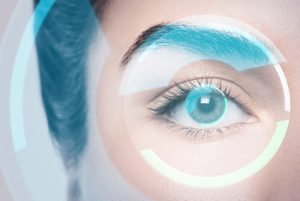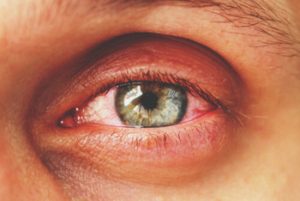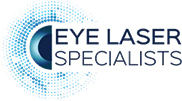Laser eye surgery is a great way of sharpening vision without needing glasses or contact lenses. Many people enjoy clearer vision after this surgery, but the recovery period is just as important as the procedure itself. Some mild discomfort is common, but there are ways to make healing easier. Wondering how to relieve pain after laser eye surgery? This article will explain how to relieve pain after laser eye surgery and what to expect during recovery.
What Happens During Laser Eye Surgery?
 Laser eye surgery is a treatment that helps fix vision problems, so you don’t need glasses or contact lenses anymore. There are two common types: LASIK and PRK. Both types work by reshaping the cornea, which is the clear front part of your eye, to help light focus better and improve your vision.
Laser eye surgery is a treatment that helps fix vision problems, so you don’t need glasses or contact lenses anymore. There are two common types: LASIK and PRK. Both types work by reshaping the cornea, which is the clear front part of your eye, to help light focus better and improve your vision.
In LASIK surgery, the doctor uses a femtosecond laser to make a tiny flap on the surface of the cornea. The flap is carefully lifted, and the surgeon reshapes the part of the cornea underneath with another laser. Then, the flap is put back into place, where it heals naturally.
For PRK surgery, the doctor doesn’t make a flap. Instead, the outer layer of the cornea is removed gently. Then, like LASIK treatment, the doctor reshapes the cornea with a laser to fix your vision. After PRK, the cornea’s outer layer will grow back naturally over time. Both surgeries are quick and done by a skilled eye surgeon.
What To Expect After Surgery
Understanding what happens after laser eye surgery can help you feel more confident about your recovery. Here’s what you can expect during your LASIK recovery:
- Day 1: The first day after your surgery is all about resting. You might feel some mild pain, or your eyes may water or itch. This is normal, and it should go away as your eyes start to heal. During this time, it’s best to avoid activities that need a lot of focus, like reading or watching TV. Let your eyes rest and start the healing process.
- Days 2–7: The discomfort from the surgery usually starts to improve by the second day. Yet, some things might still happen. You may experience light sensitivity (where bright lights feel uncomfortable), dry eyes, or blurry vision. These are common parts of the healing process and will improve as your eyes continue to heal.
- Week 2 And Beyond: By the second week, you will likely notice that your vision starts to get clearer. It’s normal for your eyesight to keep improving over time. During this period, you might still need to wear reading glasses or regular glasses for tasks like reading or looking at things up close. As your eyes fully adjust, your vision will get better, and you’ll see more clearly without needing glasses.
Knowing what happens after surgery can make the recovery process easier. Each day, your eyes heal and get closer to their best vision. Be patient with yourself, and remember that it’s normal to have some changes during the first few weeks.
Activities To Avoid During Recovery
To protect your eyes, avoid:
- Eye Makeup: Wait at least a week before applying eye makeup to reduce the risk of infection.
- Contact Sports: These activities increase the risk of injuring your healing eyes.
- Showering Directly On Your Face: Keep water and soap away from your eyes for the first week.
Why Does Pain Happen After Laser Eye Surgery?
It’s okay to feel some pain or discomfort after laser eye surgery. The main reason is that your cornea, the clear part at the front of your eye, has been treated with a laser and needs time to heal.
This healing process can cause a few temporary symptoms. Let’s look at them:
- Dry Eyes: After surgery, your eyes might feel dry. This is because your eyes may not produce enough tears at first. You may feel like something is in your eye, or it may feel gritty or itchy. Post-LASIK pain is very common.
- Light Sensitivity: Bright lights, like sunlight or indoor lights, might feel uncomfortable. Your eyes may be more sensitive to light than usual, making it hard to be in well-lit areas. Wearing sunglasses can help protect your eyes when you’re outside. Likewise, dimming indoor lights and limiting your screen time can make you feel more comfortable.
- Minor Discomfort: You may also feel a mild stinging or burning feeling in your eyes during the first few days after surgery. This is part of the healing process as your eyes adjust. The discomfort usually goes away as your eyes heal, and you may not need pain medication.
These symptoms are normal, and with proper care, they should improve. Learning how to relieve pain after laser eye treatment will help you feel more comfortable while you heal.
How To Relieve Pain After Laser Eye Surgery
Recovering after laser eye surgery can be smooth if you take the right steps to care for your eyes. Here are some easy and effective ways to reduce pain and help your eyes heal:
- Follow Your Doctor’s Instructions: Your eye surgeon will give you a care plan. This plan will tell you how often to use eye drops, when to rest, and what to avoid. It’s important to follow these instructions carefully to make sure you heal well and feel comfortable.
- Use Medicated Eye Drops: After your surgery, your doctor may give you medicated eye drops. These drops help reduce swelling, prevent infection, and make your eyes feel better. They are important to your healing, so be sure to use them as your doctor says.
- Avoid Rubbing Your Eyes: Your eyes may feel itchy or irritated, but it’s very important not to rub them. Rubbing can hurt the healing process and may even damage your corneal flap (the part of the eye that was treated). If your eyes feel itchy, you can use cool compresses (a clean cloth with cool water) or the eye drops your doctor gave you to feel better.
- Wear Protective Eye Shields: Your doctor will likely recommend wearing eye shields while you sleep. These shields protect your eyes from rubbing or accidental bumps, which can be important in the first few days after surgery. The shields help protect the healing process and give your eyes a better chance to rest.
- Keep Your Eyes Moist: It’s common for your eyes to feel dry after surgery. Artificial tears can moisten your eyes and keep them comfortable. Choose preservative-free drops, which are less likely to irritate your eyes.
- Stay Hydrated: Drinking water helps your body stay hydrated, including your eyes. When your body is hydrated, it can help fight dryness. To keep your eyes comfortable, combine drinking water with using artificial tears.
Following these simple tips can make your recovery from laser eye surgery more comfortable and help your eyes heal properly.
Dealing With Blurred Vision And Dry Eyes
Most patients experience blurred vision or dry eyes after laser eye surgery as part of the recovery process. These are common side effects, but they can usually be managed easily with some simple steps.
Using Artificial Tears
 To help with dry eyes, you can use preservative-free liquid tears regularly. These drops help moisten your eyes and reduce that dry, gritty feeling. They are an important part of the healing process and can make your eyes feel more comfortable.
To help with dry eyes, you can use preservative-free liquid tears regularly. These drops help moisten your eyes and reduce that dry, gritty feeling. They are an important part of the healing process and can make your eyes feel more comfortable.
Placing A Humidifier In Your Room
Another way to deal with dry eyes is by placing a humidifier in your room. A humidifier adds moisture to the air, which helps your eyes feel less dry, especially when you’re resting or sleeping.
Taking Breaks From Screens
Looking at screens for too long can make your eyes feel tired or dry. It’s helpful to take regular breaks from things like phones, computers, and TVs. Resting your eyes every 20 to 30 minutes gives them time to relax and reduces strain.
Avoiding Eye Strain Activities
Avoid activities that strain your eyes to reduce blurred vision or dryness. For example, reading small text for a long time can make your eyes work harder. Giving your eyes a break from these activities can help them heal and feel better faster.
Following these simple steps can manage dry eyes and blurred vision and make your recovery more comfortable. These are normal side effects, and with a little care, they’ll go away as your eyes heal.
Frequently Asked Questions
Can I drive after surgery?
Driving on the day of surgery is unsafe because your vision may be blurry, and bright lights could hurt your eyes. You can usually start driving again in a few days to a week after surgery, but it’s best to check with your surgeon to know when it’s okay for you to drive.
Can I wear contact lenses after the laser eye surgery procedure?
You should not wear contact lenses during your recovery unless your surgeon says it is okay. Your eyes need time to heal, and wearing contacts too soon can irritate them and slow down the healing.
Can I have eye laser surgery if I have dry eyes?
If you have dry eyes, you should talk to your surgeon before getting laser eye surgery. Dry eyes can sometimes get worse after surgery, but you can still have the surgery once they are treated. Your surgeon might suggest treatments for dry eyes before the surgery to help.
Is laser eye surgery a permanent solution for vision problems?
Laser eye surgery can give long-lasting results, but your vision may change over time because of aging or other reasons. It’s important to visit your eye surgeon for regular check-ups to make sure your vision stays as good as possible.
Can laser eye surgery fix all vision problems?
Laser eye surgery can fix common vision problems like nearsightedness, farsightedness, and astigmatism. Yet, it may not work for everyone or every type of vision problem. Your eye surgeon will help you decide if laser eye surgery is right for you based on your needs.
Am I a good candidate for laser vision correction surgery?
If you are over 18, in good health, and have stable vision, you may be a good candidate for laser eye surgery. Yet, if you have eye problems like dry eyes, glaucoma, or cataracts, you might not be a good candidate. Your eye surgeon will check your eyes and health to see if laser eye surgery is right for you.
What types of laser eye surgery are there?
There are other types of laser eye surgery apart from LASIK and PRK, such as PRESBYOND and SMILE. Your surgeon will help decide the best surgery for you based on your eye health and vision needs.
What is the difference between LASIK and SMILE surgery?
SMILE is a newer surgery compared to LASIK. In SMILE, a small piece of tissue is removed from the cornea through a tiny cut. Both surgeries are effective, but SMILE might be better for some people, depending on their eye condition.
Can laser eye surgery help with presbyopia (age-related vision changes)?
There is a laser treatment called PRESBYOND that can help people with presbyopia. PRESBYOND is made to create different focus points in each eye so you can see both near and far better. This can reduce or end the need for reading glasses for some people. Your surgeon will help you decide if PRESBYOND is the right option for you.
Can laser eye surgery be done on both eyes at the same time?
Yes, laser eye surgery is usually done on both eyes during the same session, which can make recovery quicker and easier. You may choose to have surgery on one eye at a time, depending on your comfort level and what your surgeon suggests.
Conclusion
 Recovering from laser eye surgery can feel like a big step, but with proper care, you can minimise discomfort and protect your eyes. By following these tips and your doctor’s advice, you’ll be on the path to clearer, brighter vision in no time. Always contact your eye surgeon if you have concerns or questions during your recovery.
Recovering from laser eye surgery can feel like a big step, but with proper care, you can minimise discomfort and protect your eyes. By following these tips and your doctor’s advice, you’ll be on the path to clearer, brighter vision in no time. Always contact your eye surgeon if you have concerns or questions during your recovery.
Your journey to a better vision starts with patience and care. Each day brings you closer to the clarity you’ve been waiting for!
If you want to learn more about laser eye surgery in Melbourne, contact Eye Laser Specialists at (03) 9070 0910 or (03) 9070 5788. Take the first step towards a clearer vision!
Note: Any surgical or invasive procedure carries risks. Before proceeding, you should seek a second opinion from an appropriately qualified health practitioner.
Sources
Boyd K 2024. Pain-Relieving Eye Drops Turbert D, editor. American Academy of Ophthalmology. Available at: https://www.aao.org/eye-health/treatments/pain-relieving-eye-drops [Accessed January 9, 2025]
Healthdirect Australia 2024. Laser eye surgery. Healthdirect. Available at: https://www.healthdirect.gov.au/laser-eye-surgery [Accessed January 9, 2025]
Meštrović T 2023. LASIK Complications. News-Medical. Available at: https://www.news-medical.net/health/LASIK-Complications.aspx [Accessed January 9, 2025]
Rowden A 2024. What to Know About LASIK Recovery and Side Effects. Medical News Today. Available at: https://www.medicalnewstoday.com/articles/what-to-know-about-lasik-recovery-and-its-effects [Accessed January 9, 2025]
Silver N 2021. What Causes Dry Eyes After LASIK Surgery, and How to Treat Them. Healthline. Available at: https://www.healthline.com/health/dry-eye/dry-eyes-after-lasik [Accessed January 9, 2025]
WebMD Editorial Contributors 2022. How to Protect Your Eyes After Laser Eye Surgery. WebMD. Available at: https://www.webmd.com/eye-health/precautions-take-after-laser-eye-surgery [Accessed January 9, 2025]




